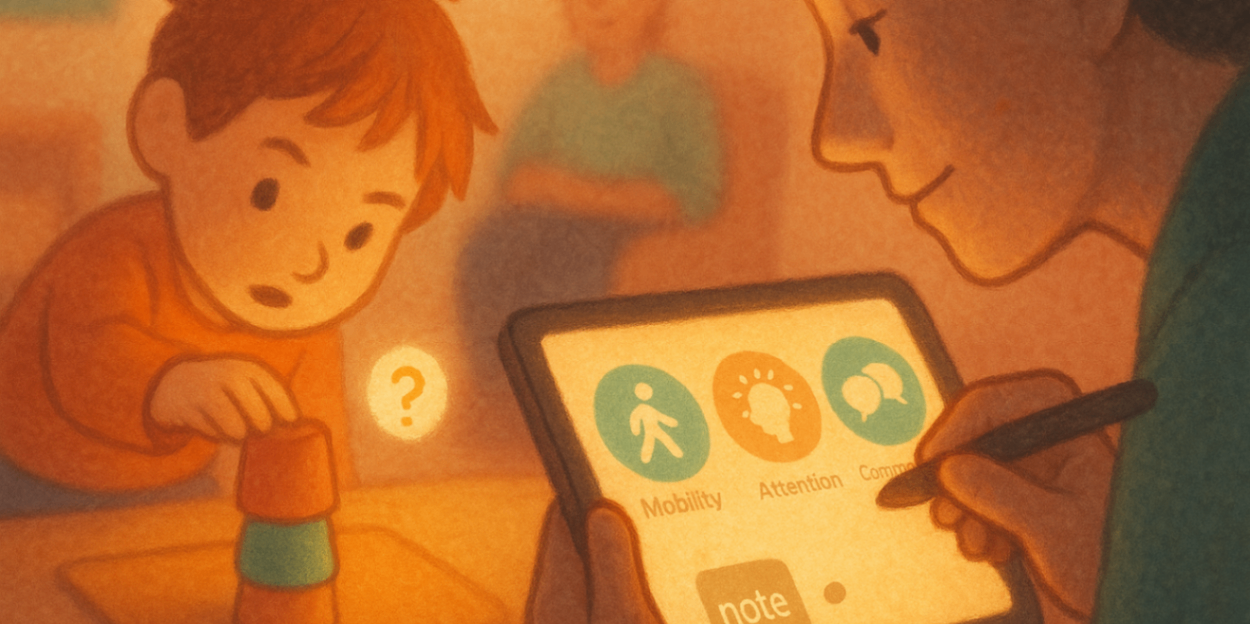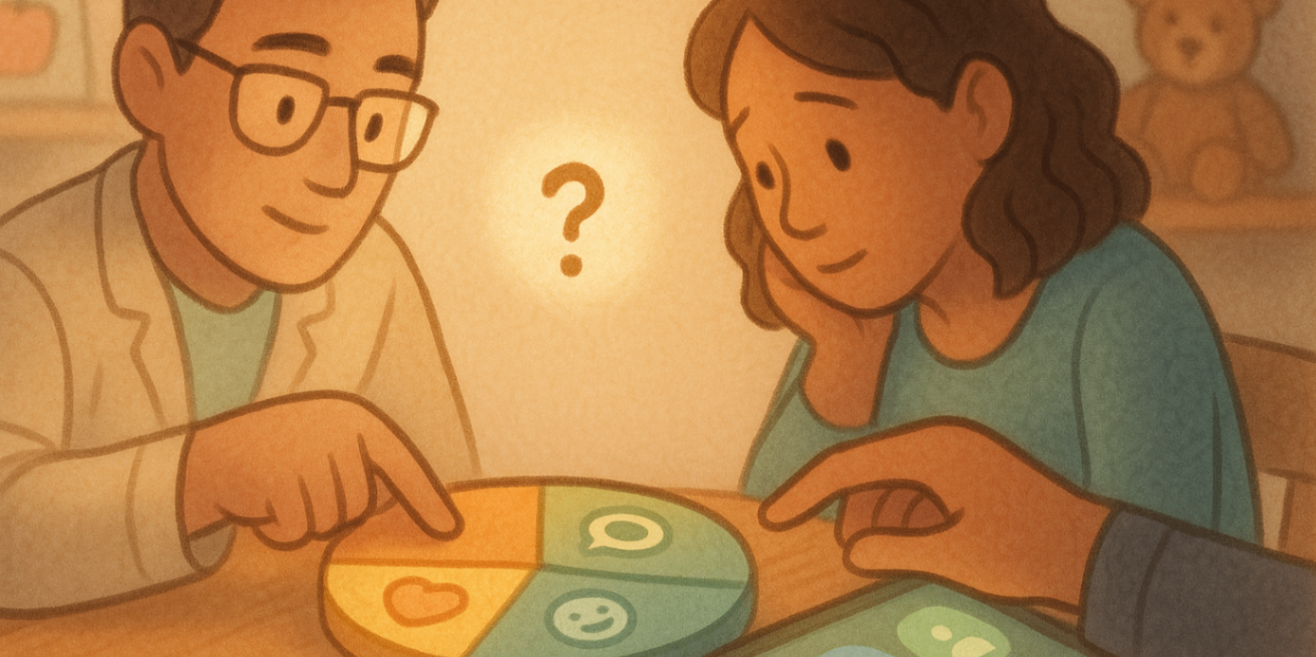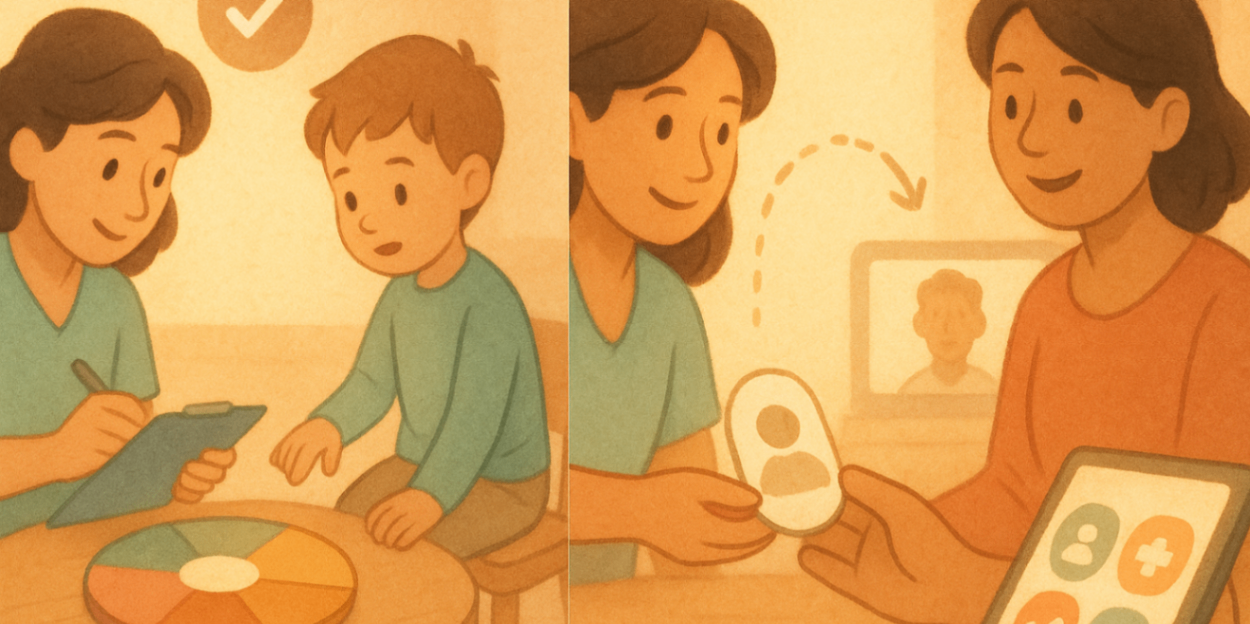
do children need a diagnosis for behaviour therapy? expert tips
2 September, 2025
Introduction
As a parent, you might see your child struggle with how they act, and this can worry you. You may not be sure what to do next or if you need to get a formal diagnosis for help. This guide looks at if a child needs a diagnosis to start behavioural therapy. We talk about how this form of therapy can help with your child’s behaviour, when it could be a good idea, and how a diagnosis can play a part in your child’s mental health. Knowing these things will help you find the support you need for your child’s behaviour.
Key Highlights
-
A formal diagnosis is not always required for a child to begin behavioural therapy in Australia.
-
Therapists use behavioural assessments, direct observation, and rating scales to create a treatment plan.
-
Early intervention can lead to positive changes in a child’s behaviour, even without a diagnosis.
-
Applied Behaviour Analysis (ABA) is a common form of therapy used.
-
Behaviour therapy helps children develop social, communication, and daily living skills.
-
Collaboration between parents, therapists, and schools is crucial for a child's success.
Understanding Behaviour Therapy for Children

Behavioyr therapy is a form of therapy that helps to change challenging behaviours in young children in a good and useful way. It uses behaviour analysis to find out why a certain behaviour happens. After that, this therapy teaches new skills that fit better in daily life. It is not only for children who have underlying conditions like ADHD or autism.
A therapist will make a treatment plan that fits your child. This often uses positive reinforcement to help your child learn the right actions. They want to make things better when it comes to communication, social skills, and daily skills. With this, your child can deal with problematic behaviours and start to build healthy habits that last over time.
Now, let's take a closer look at how this therapy works and what worries it can help with.
What Is Behaviour Therapy and How Does It Work?
Behaviour therapy is a practical way to help change certain actions. It uses behaviour analysis to see why someone acts a certain way before trying to change it. The first step is to take a close look and find which behaviours need to be changed. These can be things like problems with talking or actions that get in the way. Therapists use various treatments, such as applied behaviour analysis (ABA) or cognitive behaviour therapy (CBT), to teach new skills.
A main part of this form of therapy is positive reinforcement. This means giving rewards and praise when your child shows a behaviour you want to see. For example, in an ABA session, if the child does what you ask, they might get praise. This use of rewards helps make learning feel good and motivates your child to try the new skills again. This focus on what you can see your child do and helping them learn new abilities is what sets behaviour therapy apart from other therapies. For example, occupational therapy mainly helps your child with daily activities by working on sensory or physical challenges.
This kind of therapy works well for children with autism spectrum disorder, but it can help any child with difficult behaviours, too. The main goal is to help your child use these new skills in places like home and school.
Common Types of Behavioural Concerns in Children
Parents and teachers at times see behavioural issues in kids. These often point to a need for help. These problematic behaviours can get in the way of a child’s learning, social skills, and family life. The behaviour can be a part of developmental disabilities. The child could have underlying conditions like attention deficit hyperactivity disorder. Sometimes, though, these issues show up on their own. Do you think your child shows any of these signs?
Some common behavioural concerns are:
-
Aggression or Frequent Angry Outbursts: The child can use physical actions. The child might make threats. The child may not handle frustration well.
-
Inattention and Impulsivity: The kid can have trouble focussing. The child may make mistakes without notice. He or she can be restless, cut off others, or act without thinking.
-
Social Difficulties: The child may find it hard to start talking with someone. The child could struggle to keep friendships or spot social hints.
-
Oppositional Behaviour: This can show up as the child arguing with adults. The child may not follow rules and get annoyed fast.
Therapists use interviews and rating scales to check how strong these behaviours are. This helps them know if the behaviours are more than other kids of the same age. It also helps them build a good treatment plan. The aim is to help kids with motor skills, communication skills, and social skills.
Recognising When a Child Might Benefit from Behaviour Therapy

It can be hard to tell when your young children are just going through normal changes or when they may really need some extra support. There may be a problem if your child's actions keep getting in the way of your family life, how they do in school, or how they get along with friends. If this keeps happening, it may be good to think about getting a behaviour therapist for help. The aim of therapy is not to change who your child is. The goal is to help them have tools to handle their feelings and do better with their actions.
A behaviour therapist can help young children build healthy habits. With some encouragement and help, your kids can learn to handle problems in better ways and reach their full potential. Look at these signs. They can show if your child could get something good out of this kind of help.
Signs That Indicate the Need for Behavioural Support
How can parents know if their child might need help from behavioural therapy? It is important to watch for common patterns that keep going. Every child will act out or lose focus sometimes. But, there are challenging behaviours that keep showing up, and may stop the child from doing the things they need to do at home or school.
Look for these patterns:
-
Frequent Emotional Dysregulation: The child may have strong tantrums, meltdowns, or angry outbursts. These are hard for you to handle and seem much bigger than what caused them.
-
Persistent Inattention or Impulsivity: The child may not focus on what they are doing. They may act without thinking about it first. Your child may also not wait their turn when playing games or talking.
-
Social Withdrawal or Aggression: The child might not make friends or keep the ones they have. They may not want to be in social settings or may hit others when getting upset.
-
Anxiety and Unhelpful Thoughts: The child may worry a lot, have fears that do not match the situation, or think about things in a negative way, which can impact how they feel about themselves.
Not all these signs mean a child has anxiety disorders, mood disorders, or something like that. But these challenging behaviours may mean your child could gain from help learning new ways to deal with feelings or handle social life better. Including support can also help them work through impulsivity, inattention
Diagnosis and Its Role in Accessing Behaviour Therapy

One thing that many caregivers think about is if they need a formal diagnosis for their child. A child psychologist can give a diagnosis, and this can help make things clear and guide behaviour therapy. But it is not always needed before starting therapy for behaviour issues. Many therapists use various approaches to help young people by looking at their needs, not just by a label or diagnosis.
The process usually starts with behavioural assessments. Therapists may use direct observation of your child to see what is going on. This helps them to understand challenges and make a plan that works. You do not always have to get a referral. You can often look for help for your young people directly. Next, we will look at whether a diagnosis is needed and how therapists know what a child needs without one.
Is an Official Diagnosis Required to Start Behaviour Therapy?
You do not have to get an official diagnosis for your child before starting behaviour therapy. The easy answer is no. You can look for help even if your child has not been given a formal diagnosis. A behaviour therapist can begin working with children by focusing on the exact behavioural challenges they are dealing with right now. Therapy can help them build new skills and meet their goals, even if they do not have any diagnosed disorder.
Behavioural assessments are important in this process. The therapist will gather information about your child’s actions, their triggers, and their strengths. They use what they learn to put together a treatment plan just for your child. This plan covers the behaviours that need help, like trouble with social skills, emotional control, or impulsivity. Getting support early is a good way to help your child.
Getting a diagnosis, like attention deficit hyperactivity disorder or autism spectrum disorder, can help if you want a full treatment plan, or if you need to apply for certain funding. But you do not have to wait for this. The main thing is to give your child the support they need to handle their behaviour and to help them do their best, no matter if they have autism or another issue.
How Therapists Assess Suitability for Therapy Without a Diagnosis
So, how do behavioural therapists determine if therapy is appropriate for a child without a diagnosis? Therapists use a multi-faceted assessment process to gather a complete picture of your child's needs. This process does not rely on a label but instead focuses on practical information gathered through direct observation of your child, interviews, and standardised tools.
This behaviour analysis helps the therapist understand the function behind a behaviour—what your child is trying to achieve or communicate through their actions. For instance, a therapist might use rating scales completed by you and your child’s teacher to measure the frequency and intensity of certain behaviours across different environments. This information is crucial for creating a treatment plan that targets specific goals, such as improving communication skills or teaching new skills for managing frustration. A referral from a doctor can provide useful background, but the therapist's own behavioural assessments are central.
The assessment process typically includes several components:
|
Assessment Method |
Purpose |
|---|---|
|
Parent/Caregiver Interview |
Gathers developmental history and details about the challenging behaviours. |
|
Direct Observation |
The therapist observes the child at home or school to see behaviours firsthand. |
|
Questionnaires/Rating Scales |
Standardised tools (e.g., CBCL, Conners 4) measure behaviour severity. |
|
Clinical Session with Child |
Allows the therapist to interact with the child and assess their skills directly. |
Early Intervention and the Benefits of Starting Therapy Without a Diagnosis
Starting therapy early, even before there is a formal diagnosis, has many important benefits. One big advantage is that early intervention lets a therapist work on challenging behaviours right away. This means these behaviours do not get worse over time. There can be a significant reduction in how severe they are. By taking action early, young people can learn new, healthy habits and build good ways to cope that will help them for the rest of their lives.
Using encouragement and positive reinforcement, like in a CBT program, helps make positive changes in your child’s life. These support systems help them reach their full potential. The first step is often the most important step when thinking about your child's future. So, let’s look at the main advantages of getting help early and working together with your child's school.
Advantages of Early Support and Collaboration with Schools
Starting behaviour therapy early is helpful, even if there is no diagnosis yet. Doing something as soon as you get worried can help a child’s development and well-being. Early behavioural treatment lets children learn new skills while they are still young. It can stop small problems from becoming bigger ones over time.
The reasons to get early support are many and important:
-
Improved Social Skills: Behaviour therapy shows children how to be with others, share, take turns, and make friends. This gives them a good start for healthy relationships.
-
Greater Academic Success: Getting help with behaviour like inattention makes it easier for children to focus during school. They do better and take part more in class.
-
Increased Confidence: Learning new skills makes children feel good about what they can do. Their confidence goes up.
-
Stronger Family Harmony: Parents learn ways to handle challenging behaviour at home with behaviour therapy. This cuts down stress and helps the family get along better.
Working with schools helps, too. Some schools need a diagnosis before they offer formal help, but many will use school support strategies based on a therapist's guidance. This means your child gets encouragement and support everywhere, not just at home.
Conclusion
To sum up, parents don’t always need a formal diagnosis before their child can access behaviour therapy. Early intervention is often the most effective approach, as it can prevent challenges from escalating and provide children with the skills they need to thrive. By recognising early signs, working closely with schools, and seeking professional guidance, families can ensure children receive support tailored to their needs.
At daar Liverpool, our accredited behaviour support specialists help families navigate NDIS pathways, create personalised strategies, and provide practical tools that build confidence at home, school, and in the community.
Book your consultation today and take the first step toward giving your child the early support they deserve.
Frequently Asked Questions
Can children receive behaviour therapy without a formal diagnosis in Australia?
Yes, children in Australia can get behaviour therapy even if they do not have a diagnosis. A behaviour therapist can do a behaviour analysis and see what help the child needs. The therapist can then make a treatment plan that fits those needs. A referral is useful, but you do not always need one to start therapy.
Is cognitive behavioural therapy helpful for mild behavioural issues in kids?
Cognitive behavioural therapy, or CBT, can be good for mild behavioural issues. The effect of CBT is clear in that it helps children spot and change the way they think and act if those ways are not helpful. It gives them simple ways to deal with problems. CBT will often use positive reinforcement too, which helps build their confidence.
Do Australian schools require a diagnosis before providing behaviour support?
Not all the time. Getting a formal diagnosis in Australia can help with getting some money help or special support. But the schools in Australia often work together with families and others. They usually give behaviour help to kids after looking at what they need. They also listen to parents and therapists for advice.
.svg)

















